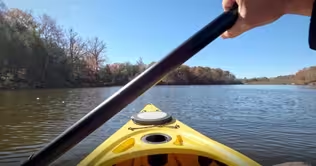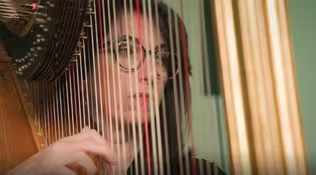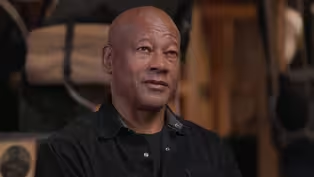
Jean Thomas: The Traipsin' Woman
Clip: Season 30 Episode 14 | 6m 2sVideo has Closed Captions
Jean Thomas traveled through Appalachia documenting traditions of the region.
Jean Thomas, The Traipsin’ Woman, made a name for herself by travelling the mountains of Eastern Kentucky to record and document the traditional singin’ gatherin’ of the region, which later inspired her to found the American Folk Song Festival.
Problems playing video? | Closed Captioning Feedback
Problems playing video? | Closed Captioning Feedback
Kentucky Life is a local public television program presented by KET
You give every Kentuckian the opportunity to explore new ideas and new worlds through KET. Visit the Kentucky Life website.

Jean Thomas: The Traipsin' Woman
Clip: Season 30 Episode 14 | 6m 2sVideo has Closed Captions
Jean Thomas, The Traipsin’ Woman, made a name for herself by travelling the mountains of Eastern Kentucky to record and document the traditional singin’ gatherin’ of the region, which later inspired her to found the American Folk Song Festival.
Problems playing video? | Closed Captioning Feedback
How to Watch Kentucky Life
Kentucky Life is available to stream on pbs.org and the free PBS App, available on iPhone, Apple TV, Android TV, Android smartphones, Amazon Fire TV, Amazon Fire Tablet, Roku, Samsung Smart TV, and Vizio.
Providing Support for PBS.org
Learn Moreabout PBS online sponsorshipBut first, traipsing, or to traip, means to walk around with no real purpose or direction.
And there‘s no better example of that than the Traipsin' Woman herself, Jean Thomas.
Born in eastern Kentucky, Thomas made a name for herself traveling via wagon and traipsing through Appalachia as a court reporter.
Now, during her travels, she learned about traditional singing and gathering within the region.
And Thomas would later take this experience and form And Thomas would later take this experience and form the American Folk Song Festival, which ran through most of the 20th century, and was dedicated to the preservation of traditional folk music.
Let's take a look at the complicated legacy of Kentucky's own Traipsin' Woman.
[music playing] This is Jean Thomas, the Traipsin' Woman, founder, Thomas, the Traipsin' Woman, founder, director of the American Folk Song Festival, held each year on the second Sunday in June in the woodland beyond the garden wall of my museum home, Wee House in the Wood, in Ashland, Boyd County, Kentucky.
Jean Thomas was born Jeanette Bell in 1881 here in Boyd County, Kentucky.
Bell in 1881 here in Boyd County, Kentucky.
She was the fifth of six children and she grew up to become, I like to call her an Appalachian folklorist.
She was an entrepreneur.
She was also a manager for a little while.
She did a great number of many different things.
Jean Thomas was a woman of her time, and that was a time when people from other parts of the country were getting interested in and discovering folk music.
Many people were fascinated by and wanting to establish these connections between mountain culture and Elizabethan England.
Thomas believed that the Elizabethan era's minstrels, the traveling minstrels, were directly connected to the folk music in Appalachia because they would have been brought here from England by colonists.
And she thinks that those were just continuously passed down by an oral tradition.
They might have been modified somewhat over the centuries, of course, if it was an oral tradition.
But she definitely thought that was where the root of it was.
And she thought it was invaluable for people of the mountains to understand where they had come from.
During Jean's travels as a court stenographer, she had an opportunity one day on a Sunday that she went traveling with some friendly neighbors she had met.
And they heard some music playing, and they told her, they're like, “Oh, it's the singing gather and you go on.
You can go sit and listen to that, and we'll pick you up on our way back.” And she said that she came into this clearing with a windowless cabin and there were all these musicians that had gathered.
And this was something they just did for fun.
They would come and play religious music, folk music together.
And that was clearly a huge turning point for Jean.
She held on to that for decades.
And that is the idea behind the American Folk Song Festival.
The American Folk Song Festival was her rendition of what she first witnessed when she happened upon this.
It was like a one-room cabin with no windows.
And there were all these people gathered around on a Sunday in Kentucky in the mountains singing Elizabethan ballads.
And she was probably just blown away.
The very first American Folk Song Festival was actually an informal event held at Jean's house in her backyard.
This was just a small gathering of some friends.
But one of them was the first lady of Kentucky at that time, Mrs. Sampson.
Mrs. Sampson in particular was very fond of the event and her guests were so enthusiastic.
Jean thought, “You know, I could probably do this every year.” The second American Folk Song Festival is sometimes considered the official first because this one had 18 acts.
It was a formal event that Jean had created.
In it, Jean performed as the narrator and that was always what she liked to be.
She wore just a simple black dress and she kind of sat to the side on the stage.
And I think that's her, again, being the storyteller.
She's not in the story, but she is telling you the story.
And so they did this in front of a windowless cabin to try to emulate that first singing gathering that Jean was a part of.
And they included singing, dancing, different musicians, all of them folk musicians.
She just did things her own way and wasn't afraid to be deemed a certain thing that was dishonorable.
She's like this solo lady traipsing around the mountains and documenting all these songs of mountain people.
In 1926, Thomas met James William Day, a blind fiddler from Rowan County.
She changed his name to Jilson Setters and booked him successfully as the Singin' Fiddler from Lost Hope Hollow, an act viewed by some today as controversial.
She got certain chairs for him to sit in, props to take with him when he was performing to give him that look of the Appalachian minstrel.
He did do several recordings with the Victor Phonograph Company.
They went to New York together in 1928 for him to perform.
And then, they also went to England together and they perormed there at the Royal Albert Hall.
I feel like she is a little overlooked.
There are people that come in that are not familiar with her, and they're like, "I've lived here my whole life.
How have I not heard of her?” But then, at the same time, I will get people who say, “I am descended or related to Jean Thomas.
I was in one of the productions.
I attended one of the productions."
So, there are people left that still remember the American Folk Song Festival.
And even though it's no longer held the way Jean had it, there are other festivals that have sprung up inspired by that festival.
And so, I think that that is her legacy.
It never really ended.
It's still going just in a different format.
[Singing]
Video has Closed Captions
Clip: S30 Ep14 | 4m 54s | Chip explores Kincaid Lake State Park by kayak in Falmouth, Kentucky. (4m 54s)
Video has Closed Captions
Clip: S30 Ep14 | 7m 1s | The Kentucky Harp Society looks to make harps more accessible. (7m 1s)
Poets of Kentucky: Frank X Walker
Video has Closed Captions
Clip: S30 Ep14 | 7m 17s | The first African American to hold the honor of Kentucky's Poet Laureate. (7m 17s)
Providing Support for PBS.org
Learn Moreabout PBS online sponsorshipSupport for PBS provided by:
Kentucky Life is a local public television program presented by KET
You give every Kentuckian the opportunity to explore new ideas and new worlds through KET. Visit the Kentucky Life website.
















